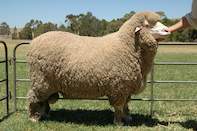
Merino SA is the South African Agricultural organisation that represents South African Merino sheep breeders. Merino SA is also the South African official organisation for the management, representation, and communication of Merino industry.
Established in 1937, Merino SA has been representing the industry for more than eighty years. The industry prides itself as a South African leader in wool and mutton production and Merino SA has a proud tradition of excellence and integrity. Merino SA is affiliated internationally and is a member of the World Federation of Merino Breeders.
Merinos are a dual-purpose breed of sheep, producing excellent top-quality medium to ultra-fine wool as well as mutton. The sheep thrive in a wide spectrum of grazing and climatic conditions.
As Merino produced extensively throughout South Africa, Merino SA has nine Merino regions in South Africa. The council members of Merino South Africa are chosen from each of these regions and each region has a representative that serves on the national board. The nine regions are situated in the Northern Cape, Eastern Cape, Western Cape, Free State and Mpumalanga provinces.
Merino SA represents an industry centred around the production of Merino sheep. The tradition of farming with Merino’s has a long- and well-established history in South Africa and the history of the introduction of this distinctive and excellent breed to South Africa is quite remarkable.
This history stretched back as far as 1789, when the Dutch Government donated two Spanish Merino rams and four Spanish Merino ewes to Col. Jacob Gordon, the military commander at the Cape at that time, on an experimental basis. These sheep were initially the property of the King of Spain, who had the sole right to export Merinos.
However, the King sent several sheep from his famous Escoriale Merino Stud as a gift to the House of Orange. As the sheep did not thrive in the cold, wet Dutch climate, these sheep were sent to Col. Gordon in South Africa. Over the centuries, the flourishing South African Merino industry we have today started with those first six sheep.
 Sheep farming is done all over South Africa, but is traditionally concentrated in the more arid regions of the country. Although the income ...
Sheep farming is done all over South Africa, but is traditionally concentrated in the more arid regions of the country. Although the income ...